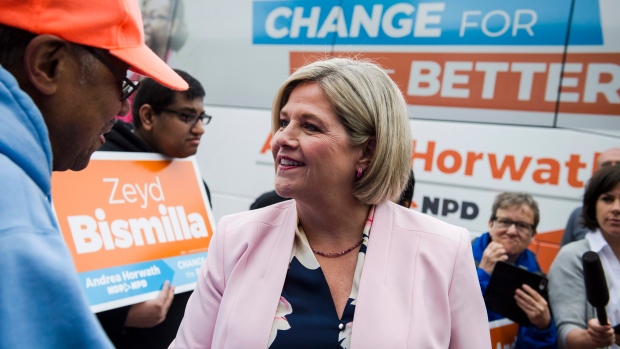Jun 6, 2018
Horwath gains in Ontario race, raising prospect of higher taxes
, Bloomberg News

Andrea Horwath, a longtime opposition lawmaker who’s never been close to power, may soon get her chance to lead Canada’s most-populous province.
Backlash against an unpopular premier and concern about a populist candidate who draws comparisons to Donald Trump could see Horwath’s New Democratic Party win this week’s election in Ontario, ushering in higher taxes for Canada’s biggest companies and high-income earners.
Ontario’s vote on Thursday has narrowed to a tight two-way race: the left-leaning New Democrats against the right-leaning Progressive Conservatives. Three parties typically are in the mix, but Premier Kathleen Wynne has already conceded she won’t win, effectively ending 15 years of Liberal Party rule.
That sets up a showdown between Horwath, 55, who has been surging in the polls, against PC Leader Doug Ford, 53, who entered the race with a wide lead. Polls show them essentially tied, though Ford’s support is more evenly spread across the province, leaving him poised to win more districts, or seats. Horwath’s hopes likely rest on a strong turnout and a Liberal collapse to stop the more-divisive Ford.
“The NDP can take advantage of it if they make a compelling closing argument in the last few days. They have far more accessible voters,” said pollster David Coletto, chief executive officer of Abacus Data.
Spending Commitments
With Wynne out of the way, Horwath, a former legal-aid counsellor from Hamilton who has been a municipal and provincial lawmaker for more than two decades, is positioning herself as the only person to stop Ford.
“Doug Ford doesn’t need to be kept in check after election day, he needs to be defeated on election day,” she told a recent rally, in a clip used for a party ad. “Only by voting NDP can we do that.”
Horwath’s platform favours tax increases and new spending. She would raise the corporate tax rate to 13 per cent from 11.5 per cent, pushing the combined federal and provincial rate to 28 per cent for Toronto-based companies like Royal Bank of Canada and Brookfield Asset Management Inc. The increase would be phased in over three years, starting in 2019-2020.
High-income earners will also pay more. Income taxes will jump 1 percentage point on salaries above $220,000 a year, and 2 percentage points for those earning more than $300,000. Luxury car drivers will also take a hit under the NDP plan, with a surtax of 3 per cent on cars costing more than $90,000.
Hydro Buyback
Horwath is pledging to backtrack on the sale of a controlling stake in electricity distributor Hydro One Ltd., saying the NDP would return it to “public ownership” within four years. That would cost the government about $6 billion based on the current share price, with the party pledging to recoup the costs through the utility’s dividends over eight years.
The NDP platform includes a host of social measures that would add $15.8 billion in annual program spending after five years, a 9 per cent increase on current projections. Revenue will rise $5.9 billion in same time period, up 3 per cent. Deficits would average about $5 billion annually, lower than the Liberal government’s forecast of almost $6 billion over the same period. Ford’s party hasn’t released a fully detailed economic platform.
“It is difficult to make the case that any of the major party platforms are fiscally responsible or are grounded in a prudent economic strategy,” said Kevin Page, a former federal budget watchdog who is now president and CEO of the Institute of Fiscal Studies and Democracy at the University of Ottawa. “Our political leaders are saying we need to further stimulate a relatively strong economy. Does this make economic sense?”
House in Order
The NDP is also pledging a province-wide child-care plan, a universal “pharmacare” plan to cover certain drug costs, a 30 per cent cut to electricity rates, converting student loans to grants, expanded dental coverage and a cap on kindergarten class sizes.
The province’s election race has generally seen all three parties pledge new spending and tax cuts -- with little regard for paying down debt that has ballooned for the largest sub-sovereign borrower in the world.
Whatever the next government, “they need to really think very seriously about getting the fiscal house in order,” Cheng Hoon Lim, the International Monetary Fund’s mission chief to Canada, said in an interview Monday in Ottawa. “They need to think about ways in which they can rein in expenditures.”
Ford has sought to paint Horwath’s party as radical and lacking star candidates to make up a cabinet. The NDP has only governed once before in Ontario -- from 1990 to 1995, an era remembered for a fiscal crunch so severe that former Premier Bob Rae forced government workers to stay home for unpaid “Rae Days.”
Horwath says much has changed since her party last ran the province.
“This is not 1990,” she said in a recent election debate. “And I’m certainly not Bob Rae.”
--With assistance from Greg Quinn


